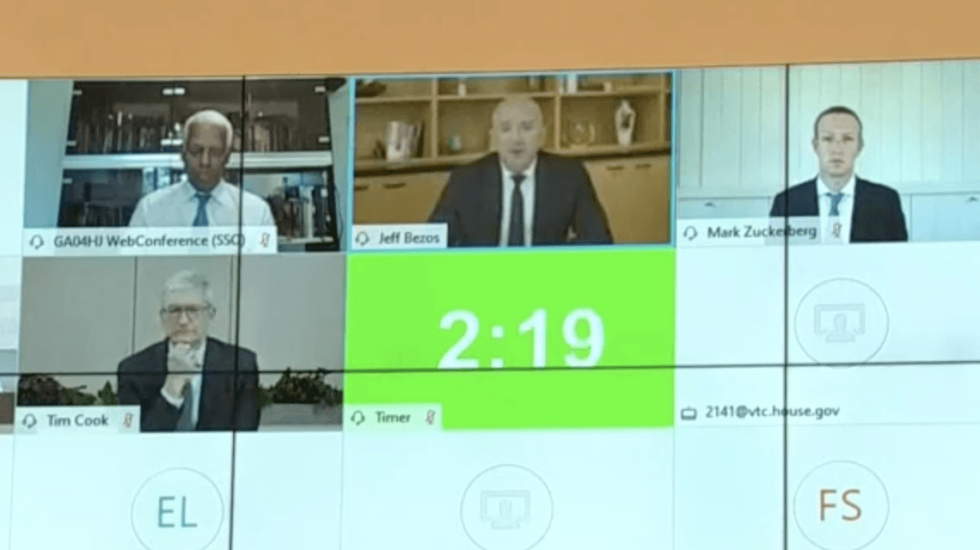Four of the world’s most powerful business leaders — the CEOs of Facebook, Amazon, Google and Apple — went before Congress today to defend their companies from accusations that they illegally suppress competition, to the nation’s detriment.
Rep. David Cicilline (D-RI), chairman of the Judiciary subcommittee on anti-trust, has branded the four companies as “monopolies” — although he says breaking them up should be a last resort.
“While forced breakups may appear unlikely, the wide scrutiny of Big Tech points toward possible new restrictions on its power,” reports the Associated Press.
Wednesday’s hearing caps a year-long investigation of accusations that the four tech giants “discourage entrepreneurship, destroy jobs, hike costs and degrade quality.”
Amazon’s Jeff Bezos, Apple’s Tim Cook, Facebook’s Mark Zuckerberg and Google’s Sundar Pichai testified remotely due to the coronavirus pandemic. Lawmakers were in a House chamber, most of them wearing maska.
After opening statements in which the CEOs tried to shine the best possible light on their companies’s behavior, they were closely questioned by members of the committee.
In response to a question from Cicilline, Pichai denied that Google “steals content from other websites and rejected reports alleging that the company steers users to its own products and sites rather than sources elsewhere on the web,” Politico reports.
“Cicilline concluded his questioning by saying the evidence against Google “seems very clear,” the Washington Post reports.
“As Google became the gateway to the Internet, it began to abuse its power,” Cicilline said. “It used its surveillance over Web traffic to begin to identify competitive threats and crush them. It has dampened innovation and new business growth … virtually ensuring that any business that wants to be found on the Web must pay Google a tax.”
Oddly, Amazon’s Bezos — the world’s richest person — didn’t get a single question for nearly two hours after the hearing began.
Rep. Pramila Jayapal (D-WA), whose district includes a Seattle area where many Amazon employees work, finally broke the ice with a question about the search engine has used third-party seller data to make its own business decisions.
“What I can tell you is we have a policy against using seller-specific data to aid our private label business,” Bezos said. “But I can’t guarantee you that policy has never been violated.”
Cicilline and Rep. Lucy McBath (D-GA) pressed Bezos over its power to compete against the third-party merchants who sell in its marketplace.
McBath told Bezos of a seller who said her company was restricted because it competed against Amazon in text book sales. And when the seller tried, multiple times, to get answers from Amazon, she heard nothing.
Bezos agreed with McBath that this is not an acceptable way to treat sellers he has described as both partners and customers.
Zuckerberg, in his opening statement, sought to portray Facebook, a 2 billion-member social network, as an underdog compared with the other companies represented at the hearing. He pointed out that Facebook competes with YouTube for video and Amazon for online advertising.
“In many areas we’re behind our competitors,” said Zuckerberg.
“That’s not what you’d expect a CEO to a multibillion-dollar titan to say, but it’s a direct rebuke to the very premise of the hearing — that Facebook is so giant, so powerful, that Washington needs to step in,” Politico says.
Times being what they are, it was inevitable that the political chasm between Republicans and Democrats would come up.
“I’ll cut right to the chase: Big tech is out to get conservatives,” Rep. Jim Jordan (R-OH), said in his opening remarks.
Jordan noted claims that Google censors Breitbart and other right-wing websites, and that Amazon’s video-streaming company temporarily suspended President Trump’s 2020 campaign account. Amazon said at the time that the campaign had violated its policies on hateful conduct.



